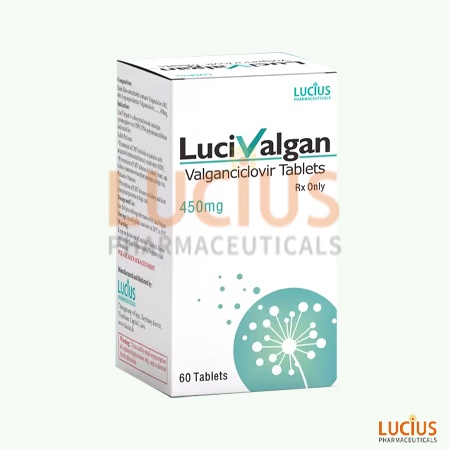

Another NameLuciValgan、Valganciclovir、缬更昔洛韦、万赛维
IndicationsValcyte treatment for cytomegalovirus infection.
Reg No.06 L 1104/24
Inspection NO.
Valcyte was developed by Roche Pharmaceuticals and was approved for market by the FDA in May 2001. It is a drug used for the treatment and prevention of specific viral infections.
The Valcyte produced by Lucius in capsule form has been launched in 2024.
Valcyte has good efficacy, but cannot be used in combination with other cytotoxic drugs as it increases the risk of bone marrow suppression, gastrointestinal and skin adverse reactions.
Valganciclovir
Adults and children with cytomegalovirus infection.
There are no available human data on use of Valcyte or ganciclovir in pregnant women to establish the presence or absence of drug-associated risk. The background risk of major birth defects and miscarriage for the indicated populations is unknown.
No data are available regarding the presence of valganciclovir (prodrug) or ganciclovir (active drug) in human milk, the effects on the breastfed infant, or the effects on milk production. Animal data indicate that ganciclovir is excreted in the milk of lactating rats. The Centers for Disease Control and Prevention recommend that HIV-infected mothers not breastfeed their infants to avoid risking postnatal transmission of HIV. Advise nursing mothers that breastfeeding is not recommended during treatment with Valcyte because of the potential for serious adverse events in nursing infants and because of the potential for transmission of HIV.
Females
Because of the mutagenic and teratogenic potential of Valcyte, females of reproductive potential should be advised to use effective contraception during treatment and for at least 30 days following treatment with Valcyte.
Males
Because of its mutagenic potential, males should be advised to use condoms during and for at least 90 days following, treatment with Valcyte.
Infertility
Valcyte at the recommended doses may cause temporary or permanent female and male infertility.
The safety and efficacy of Valcyte for oral solution and tablets have not been established in children for prevention of CMV disease in pediatric liver transplant patients, in kidney transplant patients less than 4 months of age, in heart transplant patients less than 1 month of age, in pediatric AIDS patients with CMV retinitis, and in infants with congenital CMV infection.
Studies of Valcyte for oral solution or tablets have not been conducted in adults older than 65 years of age. In general, dose selection for an elderly patient should be cautious, usually starting at the low end of the dosing range, reflecting the greater frequency of decreased hepatic, renal, or cardiac function, and of concomitant disease or other drug therapy. Valcyte is known to be substantially excreted by the kidneys, and the risk of toxic reactions to this drug may be greater in patients with impaired renal function. Because renal clearance decreases with age, Valcyte should be administered with consideration of their renal status. Renal function should be monitored and dosage adjustments should be made accordingly.
Dose reduction is recommended when administering Valcyte to patients with renal impairment. For adult patients on hemodialysis (CrCl less than 10 mL/min), Valcyte tablets should not be used. Adult hemodialysis patients should use ganciclovir in accordance with the dose-reduction algorithm cited in the CYTOVENE-IV complete product information section on DOSAGE AND ADMINISTRATION:Renal Impairment.
The safety and efficacy of Valcyte have not been studied in patients with hepatic impairment.
An overdose of Valcyte could possibly result in increased renal toxicity. Because ganciclovir is dialyzable, dialysis may be useful in reducing serum concentrations in patients who have received an overdose of Valcyte. Adequate hydration should be maintained. The use of hematopoietic growth factors should be considered.
Store Valcyte at 20°C to 25°C (68°F to 77°F); excursions are permitted to 15°C to 30°C (59°F to 86°F).
Valganciclovir is a prodrug of ganciclovir. Valganciclovir Cmax and AUC are approximately 1% and 3% of those of ganciclovir, respectively.
from FDA,2021.12